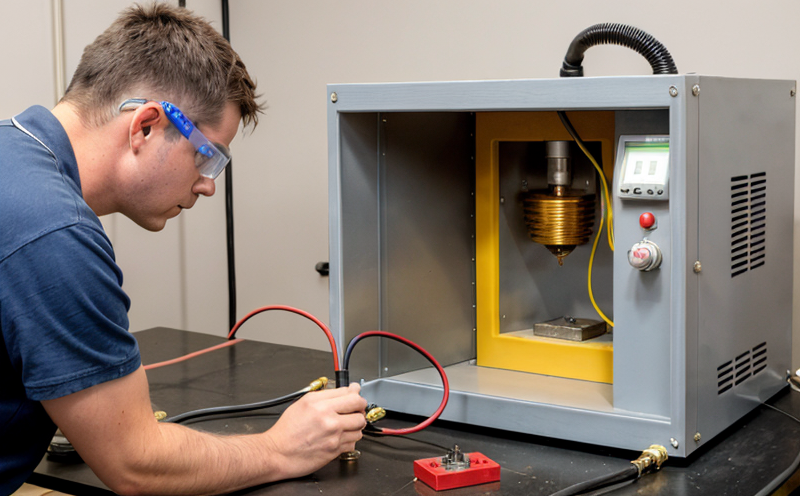ISO 60404-7 Determination of Magnetic Anisotropy
The determination of magnetic anisotropy using ISO 60404-7 is a crucial process in the metallurgy and material testing sector. This standard provides a detailed methodology for assessing the magnetic properties that vary with direction within metallic materials. Understanding these variations helps in optimizing manufacturing processes, ensuring product quality, and meeting stringent industry standards.
Magnetic anisotropy plays a significant role in the behavior of metals under magnetic fields. The orientation and distribution of magnetic domains can influence not only the magnetic properties but also mechanical performance and resistance to corrosion. In industries such as aerospace, automotive, and electronics, where precision is paramount, accurate measurement of magnetic anisotropy becomes essential.
The testing process involves several key steps. Initially, the specimen must be prepared according to ISO 60404-7 guidelines. This includes ensuring that the sample has a homogeneous structure and appropriate dimensions for the test. Once prepared, the sample is subjected to magnetic field measurements using specialized equipment capable of detecting changes in magnetization as a function of direction.
The results from these tests can be used to identify potential weaknesses or areas where specific treatments might enhance performance. For instance, manufacturers can use this information to refine heat treatment processes or apply coatings that improve the material's magnetic properties. This not only enhances product durability but also ensures compliance with international standards such as ISO 60404-7.
Accurate measurement of magnetic anisotropy is particularly important for materials like ferrites and other compounds used in various applications, including permanent magnets, electronic devices, and structural components. By providing precise data on how these materials behave under different magnetic conditions, ISO 60404-7 supports informed decision-making across the supply chain.
- Ensures compliance with international standards
- Aids in optimizing manufacturing processes
- Enhances product quality and performance
- Supports industry-specific applications, such as aerospace and automotive sectors
- Facilitates the identification of areas requiring further treatment or enhancement
Why It Matters
The determination of magnetic anisotropy using ISO 60404-7 is not just a technical exercise but a vital step in ensuring the reliability and performance of metallic materials used in various industries. Accurate measurement of these properties helps prevent failures, enhances product longevity, and ensures that materials meet strict quality control standards.
In critical applications such as aerospace components or medical devices, where even minor inconsistencies can have severe consequences, the precision provided by ISO 60404-7 is indispensable. It allows engineers to make informed decisions about material selection and processing techniques, thereby reducing risks associated with potential defects.
Moreover, compliance with this standard ensures that manufacturers meet regulatory requirements set forth by governing bodies like the International Organization for Standardization (ISO). This not only protects end-users but also fosters trust within the industry. By adhering to such standards, companies can demonstrate their commitment to excellence and reliability.
The importance of magnetic anisotropy extends beyond mere compliance; it directly impacts product performance and safety. For instance, in electronics manufacturing, ensuring consistent magnetic properties across batches ensures that components function correctly under varying environmental conditions. Similarly, in construction materials, understanding how magnetism behaves can help in designing structures capable of withstanding extreme weather events.
Eurolab Advantages
EuroLab offers unparalleled expertise and state-of-the-art facilities dedicated to the rigorous testing of metallic materials. Our team comprises experienced professionals who stay abreast of the latest developments in material science, ensuring that we apply best practices as per ISO 60404-7.
Our comprehensive suite of equipment allows us to conduct thorough analyses on a wide range of samples, providing reliable data that can be trusted for decision-making purposes. Whether you're looking at small-scale prototypes or large industrial components, our facilities cater to diverse needs with precision and accuracy.
EuroLab's commitment to quality is evident in every aspect of our operations. From meticulous sample preparation to advanced analytical techniques, we ensure that each test meets the highest standards set by international organizations like ISO. Our focus on continuous improvement guarantees that you receive not only reliable results but also actionable insights tailored specifically for your application.
By choosing EuroLab for your magnetic anisotropy testing needs, you benefit from our extensive experience and unwavering dedication to excellence. We pride ourselves on delivering accurate, repeatable results consistently across all projects. Whether it's a one-off analysis or ongoing quality control checks, we provide the support necessary to keep your operations running smoothly.
Quality and Reliability Assurance
- Compliance with ISO standards ensures reliability
- State-of-the-art equipment guarantees precision
- Meticulous sample preparation for accurate results
- Continuous quality control measures to maintain accuracy
- Skilled personnel who are up-to-date on the latest techniques and methods





